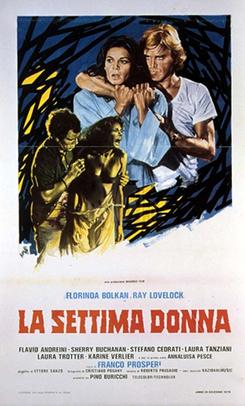Top Qs
Timeline
Chat
Perspective
The Last House on the Beach
1978 Italian film From Wikipedia, the free encyclopedia
Remove ads
The Last House on the Beach (Italian: La settima donna, also known as Terror and The Seventh Woman) is a 1978 Italian rape and revenge-thriller film directed by Franco Prosperi.
Remove ads
The American title refers to Wes Craven's The Last House on the Left, and Alexandra Heller-Nicholas stated how "combining the nunsploitation subgenre with rape-revenge, the film deviates plot-wise from The Last House on the Left substantially, but arrives at a similar ethical conclusion".[2]
It was argued that the final scene of the movie inspired the final scene in Quentin Tarantino's Death Proof.[3][4][5]
Remove ads
Cast
- Florinda Bolkan: Sister Cristina
- Ray Lovelock: Aldo
- Flavio Andreini: Walter
- Stefano Cedrati: Nino
- Sherry Buchanan: Lisa
Production
The Last House on the Beach was Franco Prosperi's second film as a director he made for producer Pino Burichhi.[1]
Release
The Last House on the Beach was distributed in Italy by Magirus and released on April 20, 1978.[1] Roberto Curti, author of Italian Crime Filmography 1968-1980 described the film as "performing very poorly in the Italian box office".[1] It grossed a total of 25.4 million Italian lira on its theatrical release.[1]
Reception
Roberto Curti stated that the film was one of the sleaziest sexploitation films.[1] Curti noted that the plot progression was minimal, and what was left was "a succession of grim, misogynist and exploitative scenes: adolescent nudes, slow motion sodomizations, vicious wounds, assorted killings."[1]
Notes
External links
Wikiwand - on
Seamless Wikipedia browsing. On steroids.
Remove ads

